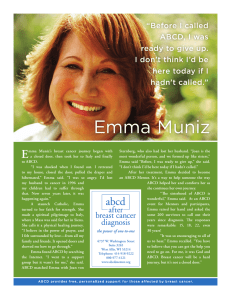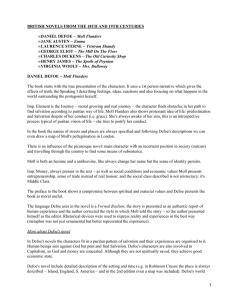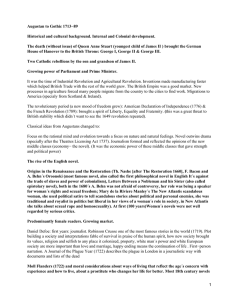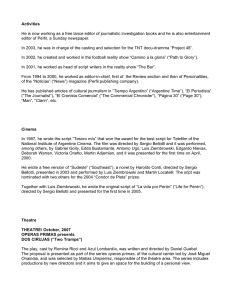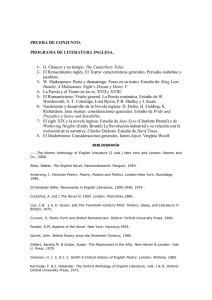Precocious Naturalism in Gustave Flaubert`s "Madame Bovary"
Anuncio
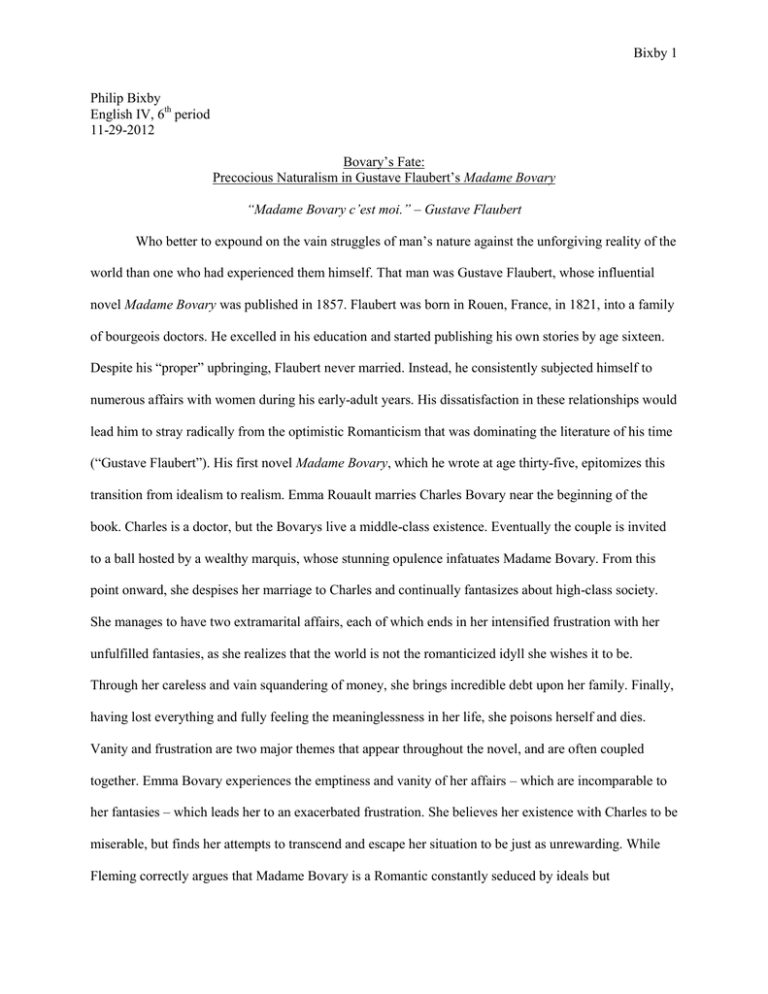
Bixby 1 Philip Bixby English IV, 6th period 11-29-2012 Bovary’s Fate: Precocious Naturalism in Gustave Flaubert’s Madame Bovary “Madame Bovary c’est moi.” – Gustave Flaubert Who better to expound on the vain struggles of man’s nature against the unforgiving reality of the world than one who had experienced them himself. That man was Gustave Flaubert, whose influential novel Madame Bovary was published in 1857. Flaubert was born in Rouen, France, in 1821, into a family of bourgeois doctors. He excelled in his education and started publishing his own stories by age sixteen. Despite his “proper” upbringing, Flaubert never married. Instead, he consistently subjected himself to numerous affairs with women during his early-adult years. His dissatisfaction in these relationships would lead him to stray radically from the optimistic Romanticism that was dominating the literature of his time (“Gustave Flaubert”). His first novel Madame Bovary, which he wrote at age thirty-five, epitomizes this transition from idealism to realism. Emma Rouault marries Charles Bovary near the beginning of the book. Charles is a doctor, but the Bovarys live a middle-class existence. Eventually the couple is invited to a ball hosted by a wealthy marquis, whose stunning opulence infatuates Madame Bovary. From this point onward, she despises her marriage to Charles and continually fantasizes about high-class society. She manages to have two extramarital affairs, each of which ends in her intensified frustration with her unfulfilled fantasies, as she realizes that the world is not the romanticized idyll she wishes it to be. Through her careless and vain squandering of money, she brings incredible debt upon her family. Finally, having lost everything and fully feeling the meaninglessness in her life, she poisons herself and dies. Vanity and frustration are two major themes that appear throughout the novel, and are often coupled together. Emma Bovary experiences the emptiness and vanity of her affairs – which are incomparable to her fantasies – which leads her to an exacerbated frustration. She believes her existence with Charles to be miserable, but finds her attempts to transcend and escape her situation to be just as unrewarding. While Fleming correctly argues that Madame Bovary is a Romantic constantly seduced by ideals but Bixby 2 inaccurately extrapolates his argument too far in claiming that she is nothing more than a bundle of seductions, Perkins correctly argues that Madame Bovary is actually a Naturalistic writing far ahead of its time which characterizes Emma Bovary as a victim of her natural dispositions and the stifling bourgeois society into which she attempts to rise. Firstly, Fleming’s assertions in his essay “The Trouble with Bovary” must be addressed. The crux of his initial argument remains strong and very supportable: that Madame Bovary herself is a hopeless Romantic and is thus inevitably seduced by Romantic ideals. Fleming claims that Emma “fantasizes her life with Rodolphe [her first lover] in a haze of crags and fountains, fruit and fisherman worthy of the worst of Byron” (Fleming). This can be seen consistently throughout Flaubert’s novel and is very closely related to Emma’s experience with Romantic literature beginning in her youth. Near the opening of Madame Bovary, Emma is introduced as a character that does little else but read. In her Romantic fiction, Madame Bovary continuously encounters “gentlemen brave as lions, gentle as lambs, impossibly virtuous, always well dressed” (Flaubert 57). Already the reader is experiencing Emma Bovary’s Romantic idealism, even before the scene at the Vaubyessard ball in which she first comes in contact with high-class bourgeois society (Flaubert 65). Fleming also claims that Bovary is “seduced by time” and, like all Romantics, she “is taken by the Age of Chivalry; she dreams of her own childhood, or she dreams of the future with Rodolphe, of a second ball, of something, anything, that is to happen” (Fleming). This accurate assertion is supportable throughout the novel but still has its origins in Emma’s readings. These predispositions in Emma become the basis of her seductions. She persistently desires something beyond what she has, some fantastical ultra-reality instilled in her soul. She dreams of running off with her lover because she assumes that the ideal reality in her mind is attainable (Flaubert 131). Up to this point, Fleming’s argument is solid and reasonable. However, he then attempts to draw his conclusion too quickly by claiming that “Emma is not a character with a personality at all, but rather a walking textbook of seductions” (Fleming). To him, Bovary is essentially a character without feeling or reason, who is simply an object swept along by the tides of her seductions without realizing it. He claims that Emma kills herself “simply because she has had affairs with all the available men that Flaubert has Bixby 3 introduced” (Fleming). However, this view fails to explain Emma’s feelings of frustration, vanity, and despair which are so inherent in this novel, and which consummate in her suicide. Emma may be immature and lacking in common sense and will, but she certainly has a realization of her seductions. This is most evident when her seductions fail to please her. For example, in her longing for Léon (her second lover), “she was suffering the same lifeless melancholy, the same numb despair she had suffered after their return from La Vaubyessard” (Flaubert 131). By the end of the novel, she fully realizes the source of her frustrations: “how wistful she was about the indescribable ideas of love she had tried to imagine for herself from books” (Flaubert 266). These selections do not imply a soulless bundle of seductions. Instead they show a pitifully passionate individual with a highly flawed and imperfect character, who comes to understand that the real world will not give her the pleasure which her idealized fantasies promised. She is not the automaton that Fleming claims; rather, she is a Romantic individual stifled and eventually crushed by her character, society, and the vanity of reality. Based on the character of Emma Bovary alone, Madame Bovary could be easily classed as a work of Naturalist fiction, and this is precisely the view put forward by Perkins in her “Critical Essay on Madame Bovary.” Perkins claims that, at the outset of the novel, “two biological factors help determine Emma’s fate: her innate sensuality and her Romantic imagination” (Perkins). These two qualities of Emma’s character are closely linked and have been sufficiently discussed, but it is important for us in this context to view them through a Naturalistic lense. Naturalism is a literary philosophy based in the idea that heredity and environment determine one’s character. As a literary movement countering the optimism of Romanticism, Naturalism’s outlook was direct, realistic, and pessimistic, and most often portrayed a very unstylized and unidealized world in which free will is basically an illusion (“Naturalism”). As Perkins shows, “Emma’s passionate nature and her vivid imagination combine with the social forces of her age to determine her fate” (Perkins). When Emma first encounters bourgeois society (Flaubert 65), this becomes one of the environmental stimuli (in a very Darwinian sense) necessary to shape and influence her predispositions towards Romanticism for the rest of the novel. Emma’s dwellings upon bourgeois society, riches, and fantasies of love all function in determining her unavoidable demise Bixby 4 (Flaubert 301). It is because of her inherent character flaws coupled with the society in which she lives that Emma Bovary commits suicide; no matter the extent to which she wills herself to escape from her situation and transcend into her Romantic idyll, she is constrained by the very nature of her character and the reality of the cruel, unrewarding true world. Being of a lower class, it is inevitable that Emma will remain there. If we were to accept Fleming’s extended argument, then Madame Bovary would still be fated to follow her passions and seductions, but would be entirely mindless by the end as to the effects they have had on her life. In my opinion, this view inappropriately detracts from Emma Bovary’s significantly pitiful and hopeless characterization. Although she is “passionate” (Perkins) and does realize her flaws (Flaubert 266) – and is thus not Fleming’s bland seduction-machine – Emma never improves, since her temperament, ingrained in her nature, cannot be altered. This is directly in line with the philosophies of Naturalist literature. Take, for example, Jude the Obscure, the 1895 novel by Thomas Hardy, arguably the greatest English Naturalist. The story of Jude is very similar to that of Emma. Instead of striving towards Romanticized bourgeois society, Jude strives towards his Romantic ideal of education (Hardy 10). During the course of his life, Jude also has two affairs like Emma, both of which fail to live up to his ideal fantasies of love. By the end of the novel, as he hears the procession of college graduates and wishes God had killed him before he was born, Jude dies a miserable death (Hardy 413-14). The striking parallels between Madame Bovary and Jude the Obscure are further evidence that Flaubert’s novel is a work of Naturalistic fiction. Perkins realizes that “Flaubert’s compelling portrait of a desperately unfulfilled woman… places the novel firmly in the Naturalist tradition as it engages readers in a tragic study of free will and determinism” (Perkins). In the same way that Jude is left unfulfilled and dead at the end of Jude the Obscure (Hardy 414), having never been able to rise from his natural situation, so is Emma left unfulfilled and dead at the end of Madame Bovary (Flaubert 303), fated from the beginning because of her natural conditions and position. Finally, if we accept the conclusion that Flaubert’s Madame Bovary is a work of Naturalist literature, we must address what makes this fact significant. Firstly, Naturalism as a movement in literature was fully and consciously developed by the writers a generation after Flaubert (those born in the Bixby 5 1840s). It is most closely associated with Émile Zola in France, whose epitomizing Naturalist works were being published in the 1870s and 1880s (“Naturalism”). The fact that Madame Bovary was written nearly twenty years before any other work pedagogically labeled “Naturalistic” would be fully enough to reveal the novel’s literary significance as a forward-looking novel. But Madame Bovary’s significance as Naturalist fiction becomes exponentially more astounding when we realize that the novel was also published before Darwin’s On the Origin of Species, the work considered by many scholars to be the genesis-point and inspiration for all Naturalist literature and philosophy. On the Origin of Species presented a radically different view of the natural world than the Romantics had done earlier. Nature was no longer a loving sanctuary in the style of Byron or Emerson, but a powerful and unforgiving force which shaped and controlled the fates of all living things. This revolution of scientific determinism went on to heavily influence the world of literature in France (Zola, Maupassant), England (Hardy), and America (Crane, London, Dreiser, Steinbeck) (“Naturalism”). But Flaubert published Madame Bovary in 1857, fully two years before Darwin published his crucially important book (1859). It is in this fact that I believe we see the full genius of Flaubert. He recognized the overbearing unidealism and determinism in the world and expressed it in his literature long before the Naturalist movement proper, and even before Darwin. This realization begs the question as to whether Naturalism’s origins lie in the ideas of Flaubert instead of Darwin. Besides, the first Naturalist writers were French, not English, and both Zola and Maupassant were protégés of Flaubert early in their lives (“Naturalism”). However, this is not to discredit the discoveries of Darwin, merely to show the comparableness of Flaubert and Darwin. Darwin came to his realizations through careful observation of the natural world. In the same way, it could be argued that Flaubert, through the experiences and affairs of his early life (his “observation”), came to very similar conclusions on the interaction of environment and humanity. Flaubert’s novel thus stresses very real and applicable understandings of life, namely fate and the flaws in human nature, that must be continually addressed and accepted, lest man stray into fruitlessly optimistic and impractically escapist idealism, which, though powerful, only promotes a helpless disconnect from reality. Bixby 6 Works Cited Flaubert, Gustave. Madame Bovary. Tr. Mildred Marmur. New York: Signet Classic, 2001. Print. Fleming, Bruce E. “An Essay in Seduction; or, The Trouble with Bovary.” Emma Bovary. Ed. Harold Bloom. New York: Chelsea House Publishers, 1994. 165-173. Rpt. in Nineteenth-Century Literature Criticism. Ed. Kathy D. Darrow. Vol. 220. Detroit: Gale, 2010. Literature Resource Center. Web. 27 Nov. 2012. “Gustave Flaubert.” Encyclopedia Britannica. 15th ed. 1992. 821-22. Print. Hardy, Thomas. Jude the Obscure. New York: Barnes & Noble Classics, 2003. Print. “Naturalism.” Encyclopedia Britannica. 15th ed. 1992. 559-60. Print. Perkins, Wendy. “Critical Essay on Madame Bovary.” Novels for Students. Ed. Jennifer Smith. Vol. 14. Detroit: Gale, 2002. Literature Resource Center. Web. 27 Nov. 2012.
